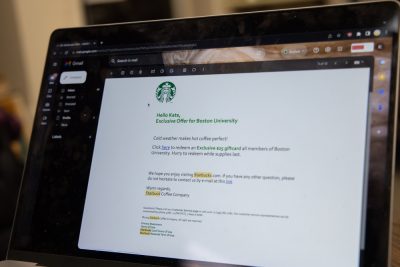The Boston University Police Department received eight reports of fraud this academic year, which is lower than the past three years, according to BUPD officials.

“In 2022, we had 17 [reports] at this time, in 2021, we had 24 at this time and then in 2020, we had ten at this time,” said Ryan Menzel, the public safety data analyst for BUPD. “So we’re down by a little bit more than half.”
BUPD and BU Information Services & Technology have been training students to identify phishing emails.
BU IS&T recently sent out a fake Starbucks scam email to some students. If students clicked on the link in the email, they would be taken to a site that educates them on security awareness, and teaches them how to identify emails trying to phish them.
“Our goal with these tests is to promote awareness, and to hopefully train people to keep their eyes open and stay vigilant,” Tom Grundig, Director of Information Security, wrote in an email.
Testing students with emails made to look like a phish is something IS&T has been doing for several years. They test staff and faculty on a more routine basis, but the student population receives a test each year as well.
“The nice thing is when we see people report these messages to IS&T,” Grundig wrote. “When we see that, it tells us that people either recognized it as a test, and/or recognized it as a potential phishing message and want to make IS&T aware.”
Hannah Portman, a freshman in CAS, said she thinks the training is beneficial for students.
“I think that test that they did was helpful for students who do fall for [phishing emails] because it showed them an example of what it would look like,” Portman said. “I think BU is doing as much as they can with that. I think it’s pretty hard to control.”
With the upcoming holiday season, Grundig wrote that this “can be a busy time for online scammers.”
“We urge people to scrutinize emails and offers they receive,” he wrote. “Be especially cautious (around the holidays) for fake delivery messages (USPS, FedEx, UPS etc.), Gift Card offers, or shopping ‘deal’ scams.”
A BU Alert was sent out to students on Nov. 21, informing them about three incidents of fraudulent activity on the Charles River Campus. The alert said two students received calls from unknown individuals purported as government officials. One student was also contacted over Instagram about a job opportunity and a fraudulent check.
The three incidents are similar to scams typically reported involving impersonation of a foreign official, according to BUPD Chief Rob Lowe.
“[There is] nothing necessarily new on the types of scams that we’re seeing this particular year,” Lowe said. “But generally speaking, you’ll have people that hold themselves out to be some sort of an authority figure, and then that kind of begins the conversations and makes students feel like they have to do whatever that person is asking them to do.”
While reports of fraud are lower this year, Lowe said that these crimes do not have to be a pattern for BUPD to send an alert to keep the community informed.
“We do whatever we can to keep our community educated and informed on what’s taking place on campus,” Lowe said. “Whenever we identify a situation that’s going to have an impact on our community, we send the alerts out.”
Onyinye Efobi, a sophomore in the College of Arts and Sciences, said BU has been doing a good job at keeping students informed about scams.
“I think they’ve been helping us keep aware of [scams],” said Efobi. “I definitely avoid the ones that I know aren’t real.”
If anyone in the community is seeing suspicious activity, Lowe encourages them to notify BUPD so they can follow up and investigate any incidents once they are reported. There is currently a detective unit within BUPD that has training specifically on scams and how to keep people safe online.
“Even one of these incidents can have a tremendous impact on a person’s life,” Lowe said. “Once we become aware of something that can have an impact in that way, we want to make sure that we’re being preventative or proactive and making sure that other students and our other community stakeholders are aware of these situations, so they don’t become victims of these incidents.”



















































































































